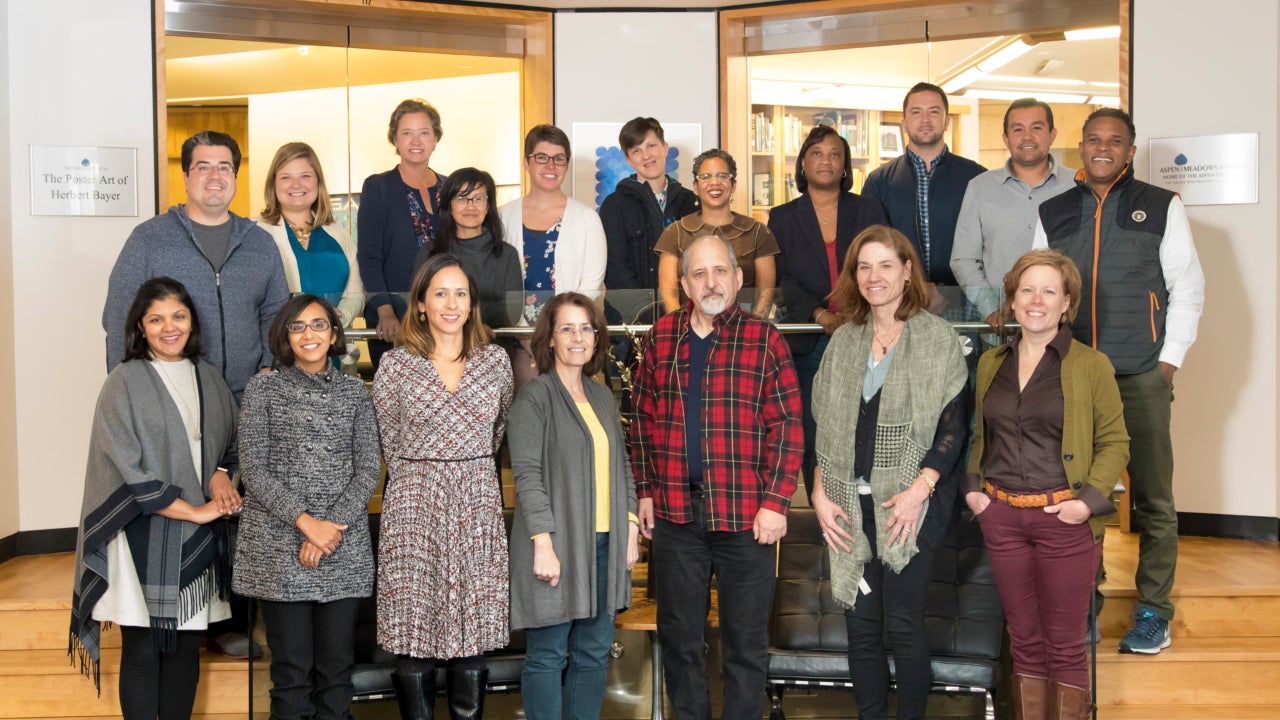Job Quality Fellow, Class of 2017-18
CEO, Coastal Enterprises Inc.

What does job quality mean to you, and why does it matter?
If you work hard and full-time, you shouldn’t be poor. While that’s been an American value for a long time, it hasn’t been an American reality for everyone. Since the late 1970s, the nature of work has changed. Wages for people at the lower end of the income scale are lagging, while pensions and access to health insurance have moved further out of reach. The quality of a person’s job is a key avenue to economic opportunity, so it’s an important issue for us to be working on as a society and one that we at Coastal Enterprises are working on as an organization.
Describe the work of Coastal Enterprises, Inc.
Coastal Enterprises, or CEI, is helping to build an economy that works for everyone, with a focus on good jobs creation, supporting environmentally sustainable enterprises, and the pursuit of shared prosperity in Maine and other rural regions and “gateway” cities. Job quality is fundamental to this mission as it directly relates to economic opportunity. We tackle economic inequality by investing in businesses and projects, advising and coaching businesses and families, and advocating for pragmatic policy solutions.
As a mission-driven investor, CEI is unique in the emerging job-quality space. We are a sizeable organization—with over $501 million under management, and a staff of 80—designed explicitly to strengthen rural and small-city communities. CEI is a federally-designated Community Financial Development Institution, or “CDFI,” and one of very few CDFIs that has always combined both finance and workforce development capacities, more recently making job quality a core strategic priority across the organization.
CEI was founded in 1977 to create employment opportunities for people who were bearing the brunt of changes in Maine’s legacy manufacturing and natural resource industries, including paper and textile mills, fisheries, and forestry. CEI began its work by investing in enterprises that would create and sustain jobs to help folks have a better livelihood for themselves and their families. After starting out in coastal Maine, the organization grew statewide, and today CEI also finances companies nationally through its investment subsidiaries.
Here in Maine, we lend $12-14 million each year to approximately 80 small businesses. We also have specialized programs that provide coaching and financing to women-led and immigrant-led businesses and to small businesses in the most rural regions of our state. We also do industry-wide work in natural resource-based industries like agriculture and nature-based tourism. And we do policy work with the understanding that sometimes there are policy solutions that can both help address industry-specific challenges and help low- and moderate-income people access opportunities.
For example, Maine has a growing number of immigrants and refugees, coming particularly from the Middle East and sub-Saharan Africa, who are settling in our small gateway cities. At the same time, the unemployment rate in Portland is 2.4 percent, so employers are desperate for employees. CEI and others are advocating for additional funding for workplace English language training so that jobseekers with language barriers can boost their employability. CEI has worked with immigrant and refugee entrepreneurs for 20 years, often in partnership with grassroots groups and social services providers. Collectively, we advocate for investment that can help individuals to get and keep good, family-supporting jobs.
How is your work connected to job quality?
CEI is known as one of the leading CDFIs dedicated to expanding rural economic opportunity. Many rural regions face special challenges, such as depopulation and an aging workforce, lack of public transportation, a declining industrial base, and lack of broadband connections. They often have “shallow” local economies that are vulnerable to the loss of one company resulting in a ripple effect of jobs loss through the supply chain. The realities faced by employers both large and small in these regions are complex, and often different than those in metro areas. To be successful, policy solutions and program best practices relating to job quality need to reflect rural and small “gateway city” experiences as well as large metro-area realities.
Job quality has always been an important feature of CEI’s work. We invest in many different companies and help them connect with the workers they need for their business to thrive. Good jobs are good for companies – reducing turnover, increasing profitability – as well as for their employees, and for their communities.
Until now, our primary focus has been to leverage CEI’s role as an investor and our team’s knowledge of the workforce training system and resources to broker training and employment-related supports that help jobseekers with low incomes access jobs being created with our financing. This has sometimes included the employer contributing to the cost of the training and developing clear advancement ladders connected to wage increases.
For example, we’ve worked with a large wood pulp company in a rural Maine town that added several large machines to make a new kind of paper. They needed workers in a very rural region with the skills and knowledge to operate the machines. Our team worked together with the company, a local community college, and other partners to help put together training programs so that people who lived in surrounding rural towns would be able to get the skills and support they needed to succeed at the company. Now, over eighty workers have been hired, and they’re earning better than average wages with benefits. These workers are then able to access additional training so they can increase their skills, and consequently their wages.
We’ve also engaged in this type of role with employers and workforce resources in cities. A new boutique hotel was starting up and needed, on day one, to have all the workers operating well and with good customer service. But it was in a time when the labor market was very tight. They needed help finding people who could work for their hotel. Again, we worked with other organizations to identify people who weren’t employed, including people from Portland’s immigrant and refugee community, to help them get training and access these jobs.
What are your organization’s goals for your work in the next few years as they relate to improving job quality?
We will be channeling greater investment toward companies creating and sustaining good jobs while, at the same time, helping the broader set of companies we work with to improve the quality of their jobs. As part of this, we will be going beyond measuring job creation and retention to measure job quality, and we will use these data to inform our work and deepen our impact.
We have developed new metrics, which we are beginning to use to assess the quality of employment at operating companies that we are financing and advising. These will include tracking living wage levels, employer-sponsored benefits, and other features of jobs that are valued by employees – such as knowing work schedules in advance, skills training on-the-job or off-site, and engagement of employees via performance evaluations at least annually. As a result, we will have a much better understanding of the quality of employment among our new borrowers and the businesses that we coach. This will then help to inform our investment decisions, supportive program activities, and policy priorities.
While that’s been an American value for a long time, it hasn’t been an American reality for everyone.”
Finally, we will engage all our employer-facing staff to help the business owners and leaders of companies we work with improve the quality of the jobs they are providing. In order to do this, we are deepening the knowledge of all of our team to be a resource on employment quality issues. For instance, we are developing a toolkit with useful information that our staff can draw on to help CEI’s loan officers and business advisors to integrate job quality into their evaluation of company viability and to engage business owners to think strategically about how they can invest in their employees as an input into their company growth plan. We are also exploring ways that we can leverage our close relationships with businesses in our portfolio and those business leaders whom we coach to support high-road employment practices. And we are exploring potential partnerships with organizations that have complementary strengths that we can work with to reach workers through our company networks and meet their needs.
What do you hope to learn or achieve through the Job Quality Fellowship?
The Fellowship is an exciting opportunity to learn from leaders of innovative organizations working on improving job quality that are similar to CEI, as well as organizations that do complementary work from around the country. It will help me to bring that learning back to CEI, share our own strategy and the lessons we are learning, and get valuable feedback. Finally, I expect that our Fellowship cohort can raise awareness about our collective work seeking to boost job quality and, for CEI, about the relevance and importance of increasing the quality of jobs in rural regions nationally.
The people who are involved in this Fellowship are working on many different pieces of the job quality problem – there are leaders investing in small businesses in lower-income communities, leaders working for unions, and leaders working for municipalities and educational institutions. By coming together, we can find ways to multiply our impact and work collaboratively on ideas that address challenges in a variety of communities, rural and urban, and in different types of industries and different-sized businesses. It’s a great opportunity for us to learn from each other, to share what seems to be working in our own context, and to identify ways we can contribute to improving the quality of work across the country.
Share now
Tweet “If you work hard and full-time, you shouldn’t be poor.” -Betsy Biemann
Tweet “We advocate for investment that can help individuals to get and keep good, family-supporting jobs.” -Betsy Biemann
Tweet “Good jobs are good for companies – reducing turnover, increasing profitability – as well as for their employees, and for their communities.” -Betsy Biemann
Keep in touch
Learn how EOP is helping low- and moderate-income Americans connect to and thrive in a changing economy. Sign up to receive news about the Job Quality Fellows and other announcements via email.
We are grateful to the Ford Foundation and The Prudential Foundation for their support of this work.
